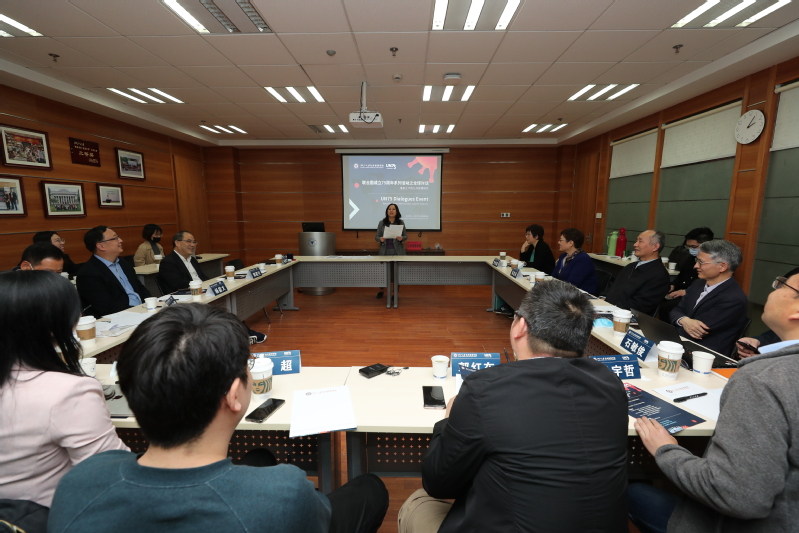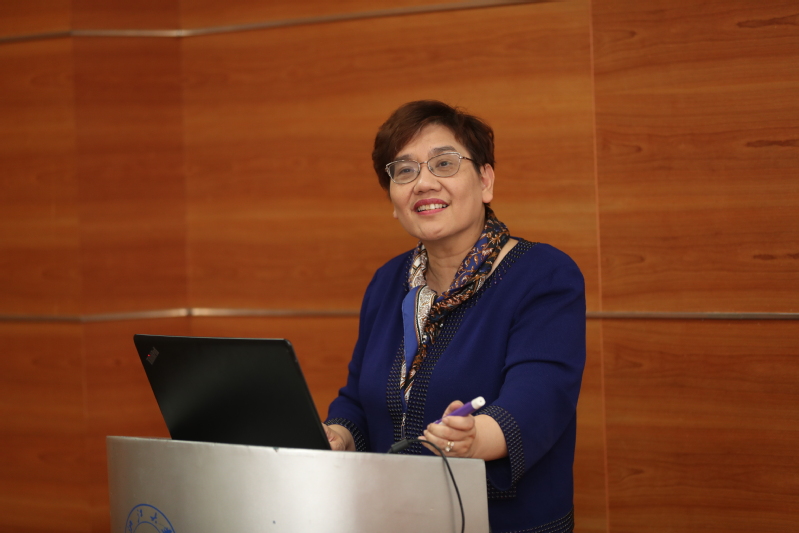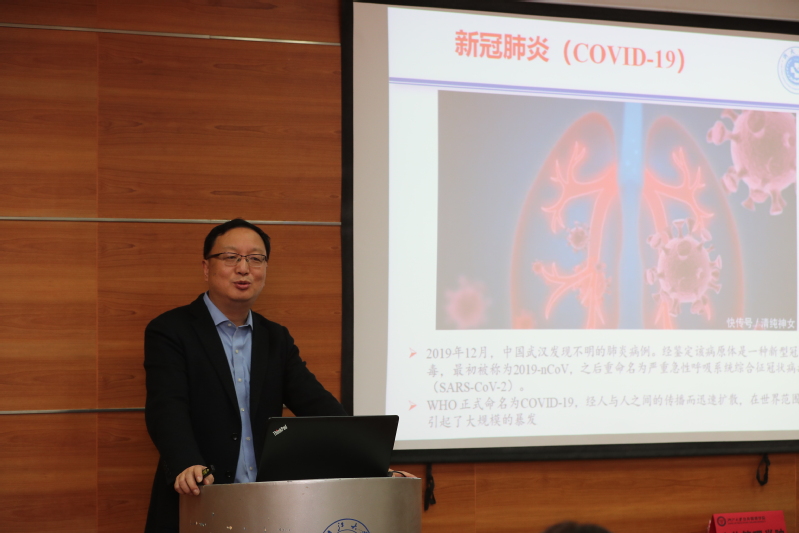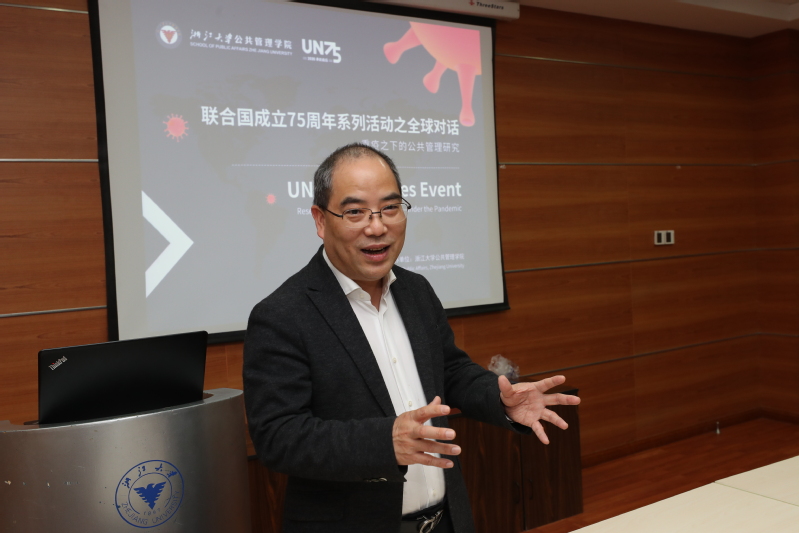This year marks the 75th anniversary of the United Nations. The UN has launched the largest global series of dialogue activities to date, encouraging research institutions around the world to carry out dialogues on the topic of building a better future for all. School of Public Affairs of Zhejiang University responded to the call of the United Nations with a dialogue event on the theme of “Public Governance Research under the Pandemic” in Room 357, Mengminwei Building, Zijingang Campus on the afternoon of April 21, 2020. The event was aimed at sharing Zhejiang experience in combating COVID-19 and issued a Zhejiang University Voice. 14 experts and scholars, from the School of Public Health, the First Affiliated Hospital, and the School of Public Administration of Zhejiang University, participated in the discussion. This event was chaired by Zhang Weiwen, deputy dean of the SPA.

Wu Xifeng, dean of the School of Public Health and deputy dean of the Second Affiliated Hospital to School of Medicine, Zhejiang University, gave a keynote speech on the topic of Construction and Development of Public Health under the COVID-19 Pneumonia Epidemic. Wu summarized the experience of Zhejiang and Hangzhou in responding to the epidemic from six aspects: first, speed and accuracy are the keys to virus identification and detection; second, they make the right decisions in the right place at the right time, and for the right people; third, big data and information technology are very important to prevent the rebound of the epidemic; fourth, full evaluation of the medical resources and response systems; fifth, preventive measures in communities, schools, enterprises, government agencies and families; sixth, the public should enjoy the full right to know. Then, she further proposed that the public health emergency management system should be improved, including optimizing the major disease prevention and control system and strengthening the construction of public health professional and academic platforms.

Yang Yida, director of the Department of Infection at the First Affiliated Hospital to School of Medicine, Zhejiang University, delivered a keynote speech from the perspective of clinicians on the opportunities and challenges under the pandemic. Yang shared their experiences of “zero infection” of doctors and nurses, “zero missed diagnosis” of suspected patients, and “zero death” of confirmed patients in this epidemic: First, the medical staff have keenness insight and social responsibility; second, we must follow the magic weapon to control infectious diseases by controlling the sources of infection, cutting off the transmission route and protecting susceptible people; insisting on early detection, early isolation, early treatment and early return; third, we should organize an interdisciplinary clinical treatment team in a timely manner in major epidemics; fourth, a strong scientific research team can find the pathogen in time, summarize their findings and release them in time. He further proposed that in the future, government-led new mechanism and strategies should be established to respond to new public health crises with multi-disciplinary participation (MDT) of public health, clinical medicine, public administration and big data analysis.

Yu Jianxing, dean of the ZJU-SPA, delivered a keynote speech on the topic of Integrated Intelligent Governance: A New Form of Modern Government. Yu believed that in the post-epidemic era, we should think how China's experience and the development of information technology can promote the theoretical innovation of modern government. He introduced the modern government concept of “integrated intelligent governance, realistic work as vanguard” in Zhejiang Province: the former is the organic combination of integrated governance and smart governance, and the latter means “work on the ground and be in the forefront”. Then he elaborated on topics such as the possible contribution of integrated intelligent governance to the governance theory, the preliminary practice of the integrated intelligent governance in the prevention and control of the epidemic and the resumption of production in Zhejiang Province, and the path of systematically promoting the integrated intelligent governance.

In the free discussion, Professor Yu Xunda pointed out that information release is a key factor in epidemic prevention and control. It is necessary to strengthen the legalization of information disclosure and establish internationally accepted standards for information disclosure. Shi Minjun, director of the Department of Urban Development and Management at the SPA, pointed out that after the pandemic, the long-term trend of the spatial economic pattern will change. Globalization will not end and the tendency of regionalization and localization will be strengthened. Globalization, regionalization and localization will affect the enterprises' location choice and market behavior, with an impact on the evolution of the spatial economic pattern. Wu Yuzhe, director of the Department of Land Management at the SPA, proposed to study epidemic prevention and control from the perspective of space governance units. Qian Wenrong, dean of China Academy for Rural Development of Zhejiang University and deputy dean of the SPA, proposed that after the pandemic, various countries will place greater emphasis on economic sovereignty. It is worth pondering how to deal with the relationship between national economic sovereignty and globalization. He Wenjiong, vice president of China Social Security Society and head of China Social Security Research Center of Zhejiang University, said that we should pay attention to the construction of the public service system under abnormal conditions and protect the basic needs of social members, especially vulnerable groups. Gao Xiang, an SPA associate professor, proposed that a professional institution should supervise administrative institutions. Guo Hongdong, deputy chairman of the Department of Agricultural Economics and Management at the School of Management, Zhejiang University, suggested that training of local government officials should be emphasized. Li Linlin, an assistant researcher at the Land and National Development Institute of Zhejiang University, suggested that China ’s rural grid governance experience summarized can provide a reference for third world countries.

This event is part of the UN75 Dialogues, and its contents will be formulated into a report, to be submitted to leaders of various countries and the UN senior officials as suggestions for future policy decision making.


